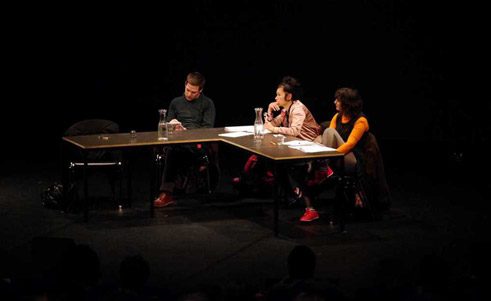Philosophy festivals
Thinking as recreation

Germans are discovering the fun of philosophy. Festivals take up subjects such as death, but also philosophical thoughts in Twitter format.
In Germany there are festivals for everything and for every taste: pop songs and Heavy metal, street food and street art. In recent years, however, festivals have emerged in a field that you would not as such associate with this form of get-togethers: philosophy. In Hanover in 2014 the Volkswagen Foundation invited guests for the fourth time to the Festival of Philosophy. A conference of the left-wing British Radical Philosophy magazine at Berlin’s House of World Cultures in the spring of 2015 attracted hundreds of people. The Dresden festival Denkfiguren (i.e. Figures of Thought) is an event for enthusiasts of philosophy who will support the festival’s third edition in 2016 by crowd funding. The Germans have discovered the fun of thinking as a recreation.
The demand is immense
The major event among philosophy festivals is Phil.Cologne, a one-week talk marathon in Cologne. Its principle is similar to that of its big sister, the literary festival Lit.Cologne: you define a few urgent questions of the day and invite well-known names to discuss them. The demand is immense: 11,000 visitors made their way to the events of the festival.Philosophy festivals are about the big and the little questions. At Phil.Cologne in 2015 participants discussed both death and philosophical aphorisms – that is, thoughts in Twitter format. The Greek Foreign Minister Nikos Kotzias spoke about the situation in Greece, the German politician Jürgen Trittin (Alliance 90 / The Greens) discussed with the Frankfurt philosopher Christoph Menke the TV political series House of Cards. The focus of the festivals was on questions of everyday ethics, current political action and the aesthetics of pop culture. In short, they are about orientation in the everyday world.
Academic philosophers remain sceptical
On the other hand, questions that touch the core area of philosophy – for example, epistemology and the philosophy of science – are absent from most festivals. Likewise the current philosophical discourse on speculative realism and the political debates of the acclerationists, a capitalism-critical tendency, about global catastrophes. It is therefore not surprising that academic philosophy in Germany looks upon the new public interest in its subject with scepticism. Markus Gabriel, Professor of Philosophy in Bonn, thinks that philosophy, and so finally also a philosophy festival, cannot offer orientation in everyday life.Yet Gabriel too has profited from the new popularity of philosophy in Germany. In 2013 his book Warum es die Welt nicht gibt (Why the World Does Not Exist) became a German bestseller. In it Gabriel brings academic philosophy of the present together with scientific questions. Since the success of his book he has been often a guest on television and radio. Thirty-three years old, Gabriel, who was appointed to his professorship at the age of twenty-nine, corresponds to the type of philosopher who is in demand at philosophy festivals. He is eloquent, can explain complex questions comprehensible and is familiar with many topics.
Philosopher as pop star
At the festivals philosophers are celebrated like pop stars and thus expand roles. So far, the academic philosophy is characterized by taking a position in the form of a text to the arguments of another text. Philosophers are in demand as speakers, as public intellectuals, who offer to make sense of something.At the philosophy festival in Hanover in 2014, the American theologian and star of the American philosophy scene Cornel West held the opening lecture on justice. In a rhetoric schooled in the style of the Afro-American preacher, he presented a groundwork for his philosophy in which Protestant theology is as important as are the Blues.
Philosophy still hardly influences everyday life
At Phil.Cologne 2015 the Slovenian Lacan specialist Slavoj Žižek subverted the role meant for him as a great thinker by repeatedly introducing his anecdotes with the phrase “Perhaps you already know ...”. Žižek has become known on YouTube through recordings of his erratic, mercurial lectures.The boom in philosophy festivals does not automatically mean that philosophy is increasingly finding its way back into ordinary life. In his book Der lange Sommer der Theorie (i.e. The Long Summer of Theory) (2015) the historian of ideas Philipp Felsch describes how in the Federal Republic of the mid-1960s philosophy became important in everyday life. Through reading groups, the perusal of booklets published by Merve publishers and the alternative art scene, theory inspired a self-empowering “ethics of the self” (Michel Foucault) as a way of living: designs for identity in gay flat shares, education in anti-authoritarian children’s nurseries and common work in collective enterprises.
From working a similar effect, the philosophy festivals of the present are still far removed. Instead of self-empowerment they present philosophy as an event: on stage people pose questions, in front of the stage people listen.